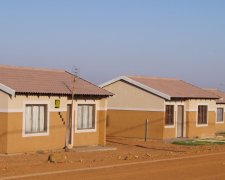
South Africa is the only country in the world that continues to build free houses for the historically disadvantaged, the Minister of Human Settlements Ms Lindiwe Sisulu, told Members of the National Council of Provinces (NCOP) during the policy debate on the Human Settlement Department yesterday.
She told NCOP MPs that since the beginning of democracy in 1994, the government has delivered 4.5 million houses to the millions of South Africans who were denied the right to a decent living during the apartheid days. “We have provided 4.5 million houses and subsidies, and our society grows phenomenally above that,” said Ms Sisulu.
Ms Sisulu said flowing from the effects of influx control and the exclusions of the past, “and flowing from the policies of large scale evictions, we inherited a dire crisis in 1994.” She also explained that the housing backlog grows as the society grows. “People must understand that the responsibility to shelter is the most fundamental responsibility of all. We both have a responsibility, the people and the government,” said Ms Sisulu.
Although the department faces challenges, Ms Sisulu maintained that there various projects are underway to help the department meet its goals. One such project is the catalytic project, which will be rolled out across the country. “Through the catalytic projects, we have set ourselves on a path to transform our urban spaces and the industry that is key to the development of settlements,” Ms Sisulu said.
She also told MPs that the government has taken a decision to partner with the Council for Scientific and Industrial Research to provide solar panels for those houses where lack of electricity has stopped the government from allocating houses. “This will ensure that we can cut down on the waiting time for houses where we have no jurisdiction over the outstanding matters,” she said.
The Chairperson of the Select Committee on Social Services, Ms Landulile Dlamini, speaking during the debate, confirmed the government’s progress in delivering houses to those who were previously them under apartheid. “Without any doubt, today’s human settlements is a million times better than yesterday’s settlements in South Africa and it becomes better each year,” said Ms Dlamini.
She told Ms Sisulu that the Committee is satisfied with the department’s 2017/18 budget, but has a few issues of concern, including the title deeds backlog to the beneficiaries of the Reconstruction and Development houses, the Urban Settlements Development Grant (USDG) and overspending and under spending in certain provinces. The Committee also noted the budgetary challenges in certain provinces.
On the USDG, Ms Dlamini said the grant must cover all urban areas, as migration affects all of them. “It should not be limited to metros,” she emphasised. As for overspending, this should be managed. “In as much as we appreciate the speed with which some provinces implement their projects, it should be within the allocated budget. Equally, the underspending by some metros is not accepted, because that money should have been used somewhere else,” emphasised Ms Dlamini.
The 2017/18 budget allocations to the provincial departments of human settlements are as follows: Eastern Cape R.4 billion, Free State R1.1 billion, Gauteng R5.2 billion, KwaZulu-Natal R 3.4 billion, Limpopo R1.3 billion, Mpumalanga R1.3 billion, Northern Cape R2.1 billion and Western Cape R2.2 billion.
Kagiso Makwana
7 July 2017

